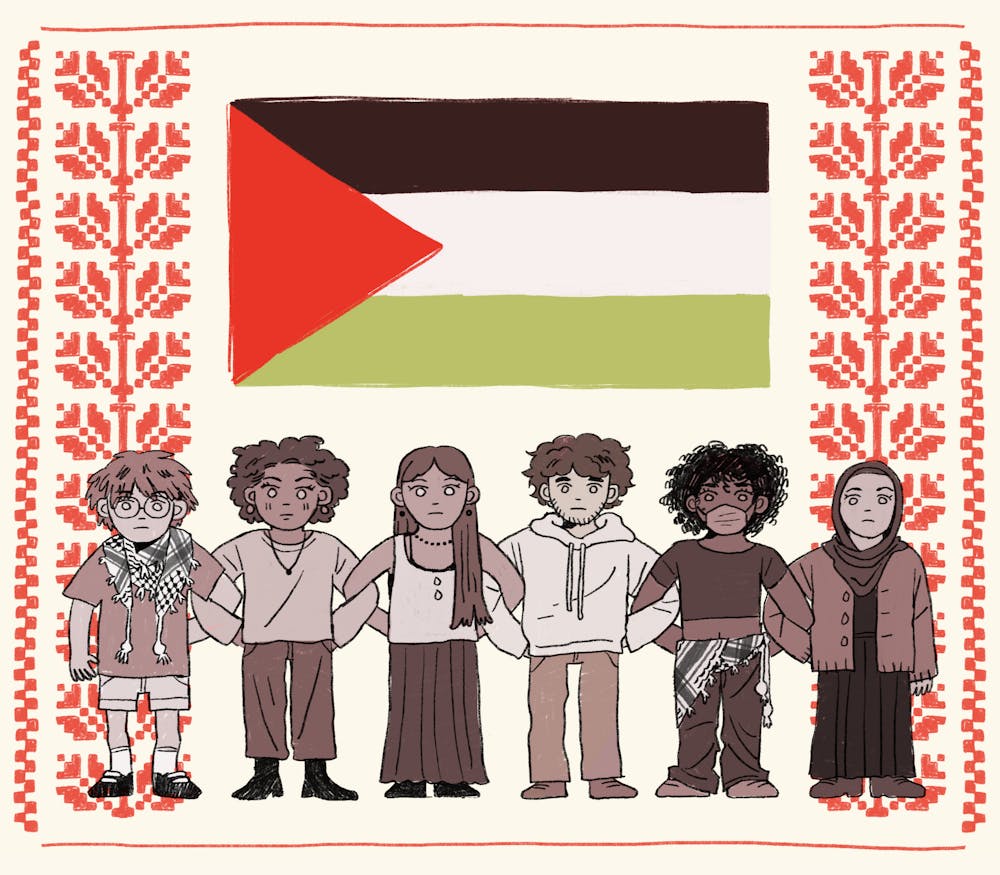On March 8, Mahmoud Khalil was followed into his Columbia apartment building by federal agents. He was arrested without a warrant, transported to a detainment facility in New Jersey and then Louisiana and forced to sleep on the floor of a cold cell. Khalil, a U.S. permanent resident, demanded an explanation for his detainment — his request was denied as was his request for a blanket.
Khalil was one of several international students and scholars who have been detained or deported after participating in pro-Palestine demonstrations. As the Trump Administration continues these attacks, American students must use their privilege to keep talking about Palestine and stand in solidarity with their international peers.
The Trump administration ordered these arrests to crack down on what they characterize as “pro-Hamas” sentiments, citing a 1952 McCarthy era statute that permits the deportation of noncitizens deemed to adversely affect U.S. foreign policy. However, some legal scholars argue that Trump’s actions go beyond the statute's scope and violate constitutionally protected freedom of speech.
While there is much to say about the Trump administration’s flagrant abuse of the law, there is another issue that we must continue to discuss: Palestine. Many international students have been on the frontlines of the protests for Palestine, but they are now facing deportation and denial of the quintessential American right to free speech. These recent changes in the political landscape have demonstrated the privilege of being an American citizen who can fully exercise their First Amendment rights without fear of retaliation.
We must start by acknowledging that this is not just a war between Israel and Hamas, as many news organizations, including The Herald, continue to call it. It’s a genocide. Over the past 18 months, more than 50,000 people have been killed by Israel’s assault on Gaza. An investigation by the United Nations alleges that Israel has committed war crimes by targeting health facilities. And in March, Israel was condemned by the U.N. and neighboring Arab states for blocking life-saving humanitarian aid to Gaza. With all of this evidence, it is clear to me that Israel is intent on destroying Palestine by any means.
The recent deportations are being done to both punish dissent and “flood the zone,” a media strategy where the Trump administration pushes a raft of executive actions such that it’s almost impossible for anyone to focus on, or become outraged by, any one thing. Every new deportation, every threat of university defunding and every press conference pulls media attention towards the spectacle and away from the issues. Given President Trump’s recent meetings with Israeli Prime Minister Benjamin Netanyahu, along with his proposal that Palestinians in Gaza should be forcibly removed and resettled, it’s clear that the Trump administration unequivocally supports Israel’s actions and has a vested interest in our silence.
It’s understandable that students, regardless of their citizenship status, would be hesitant to take to the Main Green and protest right now. In light of the Trump administration freezing millions of Brown’s federal funding, even students who are protected by their citizenship status might avoid protesting out of fear that it could result in even more funding cuts. However, American students must continue to speak out against the genocide and raise awareness on social media and in our everyday lives. Even people who read the news every day may not see the rising death tolls or recent airstrikes if not for the posts they see on social media. It’s not lost on me that keyboard activism is usually the lazy way out of doing the real work required of social movements. But given the fraught political landscape, we must continue to use the tools at our disposal. Reposts, hashtags and petitions may not feel like much, but they keep the issue from disappearing.
The Trump administration is using scare tactics to try and stop Americans from speaking out about Palestine, and they’re attacking vulnerable groups to do it. As young people, it often feels like we don’t have the power to affect change. This hopelessness is made worse by the onslaught of authoritarian policies being enacted by the current administration. But as students at one of the top schools in the country, all eyes are on us.
We must use our privilege and take a stand.
Kendall Ricks ’27 can be reached at kendall_ricks@brown.edu. Please send responses to this column to letters@browndailyherald.com and other opinions to opinions@browndailyherald.com.





